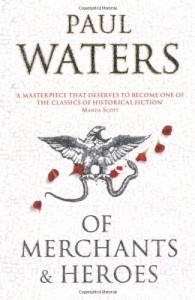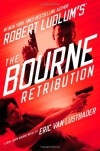Review: Of Merchants & Heroes by Paul Waters

This is one, I thought after I’d finished it, that perhaps would have benefited by having its ‘Historical Note’ at the start. I certainly found it to be a better book looking back at it after having read the Historical Note, than I did while I was actually ploughing through it. Though, I can maybe see why note was placed at the end, not least because some readers may be put off by the information about homosexuality in the ancient Greek and Roman world. Not an easy one to know how to feel about. Because while homosexuality was accepted - hell, even the Spartans encouraged it to build up comradeship - it hasn’t featured at all in any of the Roman epics I’ve read. Ever. Even ones with Greek people in them. The only mention of it I can think of, off the top of my head, is in an Anthony Riches book recently, where a prostitute is described by one of the Centurians as being able to ‘suck cock like a Greek sailor after a week at sea.’ Only a week? And see, it was something the Greeks did. Funny people, the Greeks. Well, never mind…
Of Merchants and Heroes is set at the end of the Third Century B.C., towards the end of Rome’s war with Hannibal and Carthage. A young lad called Marcus, goes on a trip to Greece with his father. Their boat, them and the other passengers, is captured by pirates. The boy’s father is killed and a young girl on the boat, decides to kill herself before the pirates can think of other ‘treatments' for her. This seems to have a profound effect upon the young boy. Father dying, hatred of the man who caused it, I can understand. The girl, less so, but there you go. He vows to all sorts of gods, to avenge his father’s death. He then finds his way back to Italy and is taken in by his uncle, a minor business man, who proceeds to marry the boy’s mother, becoming of course, his new father. Marcus is not impressed by his uncle in any way and trains as a soldier. They move to Tarentum in the south where he makes friends with the Praetor’s son, Titus. Praetor dies, son largely takes over. Then, he becomes friends - I forget how - with a vision of Greek perfection, called Menexenos.The story thus far, has essentially been a series of small incidents, chance meetings, accidental observations, potential intrigues, dinner parties and nothing of any real substance after the killing of his father in the early pages.
I could go on with all the to-ing and fro-ing between Italy and Greece, mixing business, with pleasure, with being urged to social climb by his father, to training in the gym and walking in the gardens, fields and woods with this Menexenos lad. But I won’t. That’s about all that happens from there on in, until they finally get Philip of Greece (no, not even THAT one) to come out and fight. Let’s face it, what we have here is the long drawn out tale of a love-struck, love-sick, 17-odd-year old, drippy Roman, wandering aimlessly around Italy and Greece mooning after some athletic, god-like Greek boy.
It isn’t what I expected, but it isn’t because of that that I found it dull. It isn’t because of the homosexuality not fitting in with my (ancient) world view either. I know it went on, just as it does today, so what? It is dull, because absolutely nothing at all happens in a very, very, v e r y long time. You start off well meaning enough with “OK, this looks like it could be interesting.” Then, “Right, it’s clearly one that takes its time warming up.” To, ”So, what IS this about then? A gay love story, set in ancient Rome and Greece….why? Why set it back then, why not set it now? Ah, yes, ‘Brideshead Revisited’ has already been written.” Through, “Have I missed something? No, I haven’t. It’ll really have to pull it out of the fire in the last 100 pages…actually, even if it does, it’s wasted my time with the first 300! Oh well, only another 100 pages to go…” Finally you finish it off with a thump down on the coffee table and a “Oh, well, at least I got it cheap.” Nothing more.
Several times, it seems like he tries to put in something to suggest it is, in case you didn’t notice, something more than it actually is. Late on, when setting off after the pirate who has captured his step-father, he says; “it was the dark anger that had fashioned my life and made me different from other men.” Well, no. From having read the whole thing, there’s very little evidence, apart from a couple of chance meetings or sightings of the pirate that had very little effect on him once they were over, that this pirate has had any effect on him whatsoever. Unless, the pirate DID make him ‘different to other men’? Can’t see it. The incident with the pirate, the girl jumping to her death and the killing of his father, apart from neatly, too neatly, book-ending the story, have had little, to no bearing on the story or his character. The addition of this phrase at the end, smacks of desperation to me. Of the writer admitting he has failed to convey this theme through the story and character development during the book and falling back on realising he's going to have to come out and state it. So we add importance to the story, that really isn't found there.
But, wait - let’s now read that ‘Historical Note’…
The Historical Note talks of the book's lofty aims and as though they have been achieved. No. But it does help explain some of the waffle I’ve read. So, say we give it a chance, say we read all the way through thinking “what the f@ck?!” Then read the historical note and think “OK, maybe…”
There is an interesting air of melancholy, as the Historical Note, erm, notes. Let’s say it's a look at the Greek and Roman worlds on the cusp of change. He is, from the title onwards, comparing the new Roman, with the older Greek, civilisations, the ancient world changing to Merchants, from Heroes. And when contrasted with the Greek, the book finds Roman civilisation distinctly lacking. So, maybe it is showing the end of the simple, but noble - and what we would nowadays almost dismissively call ‘lofty’ - ideals of the Greeks, being given the elbow by the Romans. Rome seems on the edge of its aspirations of Empire, Greece and the Greek ideal, is on the wane. That’s where he’s at, fairly and squarely. For him, the Greeks are philosophers and poets, athletes and warrior heroes, educated by, and the latest in a long line of, philosophers, poets, heroes and athletes. Romans are grubby, dull, penny-pinching merchants and career soldiers. Further more, it does seem to suggest that Rome’s empire building began, or rather gained pace, through a desire to keep any possible enemies at as long an arm’s length from Rome as possible. Sensible enough. The Greek influence, or at least its philosophers and poets (if not its athletic homosexuals), were beginning to find their way to the region’s new centre of power and change Rome’s dour brick buildings to something more artistic that the book can live with. What it can’t live with, is the loss of - what seem to be - Greek ideals of, for instance, art for art’s sake, sport for the love of sport and the pursuit of physical perfection that it both needs and develops. But, like it or not, and the prevailing mood of the book is not to like it overly much, Rome is on the rise. Its message is being spread far and wide through its tradesmen, rather than its artisans. Through merchants and merchandise, rather than ideals and heroes. Roman values you can touch and buy, Greek you can’t. All that.
Why the homosexual love story, when a hetrosexual one could well have achieved the above aims just as well? Yeah, he’s in love with this Greek perfection. I get that. Maybe it’s by showing - and it’s most certainly not the ‘bisexuality (that was) ubiquitous in the ancient world,’ our lad Marcus is no way bisexual. He never even looks at a girl after the first few pages. He is full-on gay. Which kind of negates the premise, but never mind - love for love’s sake. That could/does reach across the ‘borders’ subsequently imposed on it at “the end of the classical period.” Maybe that was what he was thinking about while writing all the melancholic meandering.
Looked back on in this light, it is indeed possible it did achieve some of its purpose. It’s a pity that you have to wait until the story’s finished to get it. I’m not gonna say it justifies the previous hundreds of pages of Fotherington-Thomas-like ‘Hello clouds, hello sky,’ drifting aimlessly backwards and forwards across the Aegean, but when you have read the Historical Note, it does at least give a little perspective to all the flannel. Some of it, anyway. You can see perhaps why he wanted to write the book. Though not why he forgot to put a story in it. But, take out the homosexual love story - and you’ve got nothing left.
I’m going to have to differ with Manda Scott quoted on the cover of my copy, here and say that far from being “A masterpiece that deserves to become one of the classics of historical fiction” this is a monumentally dull, very slight tale, that only gains some measure of respectability, by looking at it in the rearview mirror. I came close to giving up many times, kept hanging on in the hope it was going to get better, but it didn’t. I’m still thinking, despite the oft-stated physical stature and presence and the many descriptions of their stamina and ability with all forms of weaponry - they wouldn't have lasted five minutes with Anthony Riches' motley crew of barely house-trained, roughneck, Tungrian assault troops, freezing their knackers off out there on Hadrian's Wall. Not even four minutes if you started referring to your mate's body as 'perfection', 'god-like' or 'beautiful.' No firm handshakes, beers all round here, that’s for sure.




